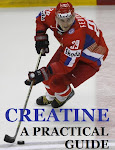
Here are some tips on eating prior to a game or power skating session:
The Pre-Event Meal should be:
- Small
- Eaten approximately 2 - 3 hours before the event so as not to be full or hungry when competing
- Mainly carbohydrates (comlex) which are more easily digested than protein or fats
- Moderate in protein and fats
- Include water
- Not too high in fibre
- Food the athlete likes and has confidence in
Please, don't confuse a small, pre-event meal with how you should be eating in general. You will need alot of calories, and it is normal to eat alot during the development part of your season. The pre-event meal simply refers to the 2-3 hours prior to your icetime or training time.
Here are some Pre-Event suggestions:
- Cereal with skim milk and banana
- Poached egg on dry toast with fruit juice
- Vegetable soup and crackers with skim milk
- Blender shake: fresh fruit, skim yogurt, orange juice, ice cubes
MYTH: Quick energy foods like pop, chocolate bars and honey will give you tremendous energy for performance.
FACT: These foods can actually harm rather than help if you eat them an hour or less before your performance. The simple sugar activates insulin and causes the sugar in the blood to be removed too fast. The resulting low blood sugar can leave you tired or weak.
MYTH: Drinking water while exercising can cause stomach cramps.
FACT: On the contrary, it may be dangerous not to drink water during exercise, especially in hot weather. A 1 to 3 kg weight loss due to sweating can harm your performance and may lead to dangerous dehydration. Thirst is not a good indicator of fluid needs. The thirst mechanism is actually dulled during and following exercise. Drink water before, during (every 10 to 15 minutes) and after exercise whether you are thirsty or not. Rule of thumb: For each pound of weight lost as seat, athletes should drink 2 cups of water.
Why is water so important? Water functions in the body as:
- a solvent in digestion
- a major portion of the blood
- a lubricant
- a coolant (for prevention of overheating)
The Pre-Event Meal should be:
- Small
- Eaten approximately 2 - 3 hours before the event so as not to be full or hungry when competing
- Mainly carbohydrates (comlex) which are more easily digested than protein or fats
- Moderate in protein and fats
- Include water
- Not too high in fibre
- Food the athlete likes and has confidence in
Please, don't confuse a small, pre-event meal with how you should be eating in general. You will need alot of calories, and it is normal to eat alot during the development part of your season. The pre-event meal simply refers to the 2-3 hours prior to your icetime or training time.
Here are some Pre-Event suggestions:
- Cereal with skim milk and banana
- Poached egg on dry toast with fruit juice
- Vegetable soup and crackers with skim milk
- Blender shake: fresh fruit, skim yogurt, orange juice, ice cubes
MYTH: Quick energy foods like pop, chocolate bars and honey will give you tremendous energy for performance.
FACT: These foods can actually harm rather than help if you eat them an hour or less before your performance. The simple sugar activates insulin and causes the sugar in the blood to be removed too fast. The resulting low blood sugar can leave you tired or weak.
MYTH: Drinking water while exercising can cause stomach cramps.
FACT: On the contrary, it may be dangerous not to drink water during exercise, especially in hot weather. A 1 to 3 kg weight loss due to sweating can harm your performance and may lead to dangerous dehydration. Thirst is not a good indicator of fluid needs. The thirst mechanism is actually dulled during and following exercise. Drink water before, during (every 10 to 15 minutes) and after exercise whether you are thirsty or not. Rule of thumb: For each pound of weight lost as seat, athletes should drink 2 cups of water.
Why is water so important? Water functions in the body as:
- a solvent in digestion
- a major portion of the blood
- a lubricant
- a coolant (for prevention of overheating)








